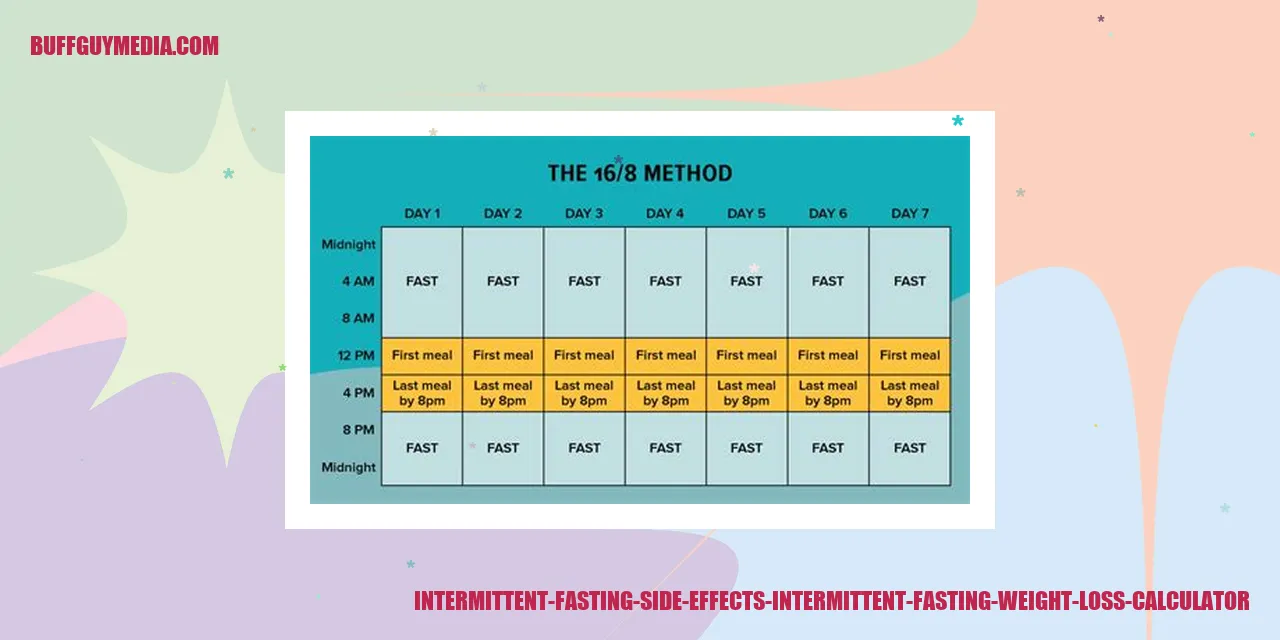Intermittent Fasting Weight Loss Calculator | A Scientific Approach
Discover the Benefits of the Intermittent Fasting Weight Loss Calculator
Understand the Mechanics of the Intermittent Fasting Weight Loss Calculator
Curious about how the intermittent fasting weight loss calculator works? This cutting-edge tool enables individuals to tap into the potential of fasting as an effective weight loss strategy. Using advanced algorithms, the calculator estimates the amount of weight that can be driven off through different intermittent fasting protocols.
Discover the Key Factors Considered by the Intermittent Fasting Weight Loss Calculator
When utilizing the intermittent fasting weight loss calculator, there are several crucial factors that it takes into consideration. These factors include an individual’s starting weight, desired weight, chosen fasting protocol (such as 16:8 or 5:2), and the duration of the fasting period. By inputting these variables, the calculator provides personalized insights into the expected outcomes of your weight loss journey.
Personalizing Your Weight Loss Journey with the Intermittent Fasting Weight Loss Calculator
The versatility of the intermittent fasting weight loss calculator allows you to tailor it to your specific needs. Whether you’re a novice or an experienced faster, the calculator enables you to adjust various parameters according to your goals. By modifying the fasting duration, frequency, and calorie intake during eating windows, this tool offers customized predictions for your weight loss journey.
Understanding the Limitations of the Intermittent Fasting Weight Loss Calculator
While the intermittent fasting weight loss calculator is a powerful asset, it’s important to recognize its limitations. The calculator provides estimates based on mathematical algorithms and general assumptions about how your body responds to fasting. However, every individual has unique metabolic variations and other factors that may influence actual weight loss results. As a guideline rather than an absolute predictor, the calculator serves as an informative tool to help track your progress on your weight loss journey.

Unveiling the Advantages of Intermittent Fasting
How does intermittent fasting contribute to weight loss?
Intermittent fasting has become increasingly popular as an effective strategy for shedding excess weight. By restricting the eating window, intermittent fasting creates a calorie deficit, a key factor in losing pounds. Moreover, this eating pattern can also reduce insulin levels, encouraging the body to utilize stored fat as a source of energy. Intermittent fasting assists in balancing hunger hormones, minimizing cravings and compulsive eating habits, thus supporting sustainable weight loss.
What additional health benefits does intermittent fasting provide?
Intermittent fasting brings forth a myriad of health benefits beyond weight management. Studies suggest that it can enhance overall metabolic health by diminishing oxidative stress and inflammation within the body. By providing the digestive system with intermittent breaks, fasting may also boost gut health and foster a thriving gut microbiome, facilitating optimal digestion and nutrient absorption. Furthermore, intermittent fasting has been linked to improved cognitive function, heightened stress resistance, and increased lifespan.
[[READMORE]]
Can intermittent fasting enhance insulin sensitivity?
Indeed, intermittent fasting can enhance insulin sensitivity, a vital aspect of maintaining stable blood sugar levels and preventing the onset of conditions such as type 2 diabetes. By reducing insulin levels, intermittent fasting enables cells to respond better to insulin. This improved insulin sensitivity boosts the body’s ability to effectively utilize glucose, reducing the risk of insulin resistance and promoting long-term metabolic health.
Does intermittent fasting help accelerate metabolism?
Also read:
Oniou Fitness Tracker App: Achieve Your Fitness Goals
Kelly Pickler Weight Gain: Unveiling the Surprising Transformation
While intermittent fasting is not primarily focused on speeding up metabolism, it does have a positive impact on metabolic function. During fasting periods, the body transitions from relying on glucose as the primary energy source to utilizing stored fat. This metabolic shift, coupled with the potential rise in human growth hormone levels during fasting, may lead to a modest increase in metabolism. However, the main weight loss effect of intermittent fasting stems from reduced calorie intake instead of a sustained elevation in metabolic rate.

Intermittent Fasting: Different Methods to Improve Health and Aid Weight Loss
The 16/8 Method: How Does it Work?
The 16/8 method is a popular approach to intermittent fasting, where you restrict your eating window to only 8 hours each day and fast for the remaining 16 hours. This method often involves skipping breakfast and having all meals within a specified 8-hour period, for example, between 12 pm and 8 pm. During the fasting duration, only calorie-free beverages like water, black coffee, or herbal tea are permitted. Advocates of this method claim that it simplifies meal planning, improves metabolic health, and aids in weight loss.
The 5:2 Method: A Closer Look
The 5:2 method requires eating normally for five days of the week while reducing calorie intake to around 500-600 calories per day for the other two days. These fasting days can be chosen freely but should not be consecutive. On fasting days, low-calorie meals or a couple of small meals throughout the day are typically consumed. Many believe that this method supports weight loss, boosts insulin sensitivity, and provides potential health benefits by promoting cellular repair and disease prevention.
Alternate Day Fasting: An Effective Intermittent Fasting Method
Alternate day fasting involves alternating between normal eating and either complete or partial fasting. On fasting days, individuals restrict calorie intake to a specific reduced amount, generally around 500-600 calories. Some variations of this method allow one small meal or snack on fasting days, while others practice total fasting. While alternate day fasting can be more challenging due to longer fasting durations, it can yield similar benefits to other intermittent fasting methods, including improved weight management and metabolic health.
The Eat-Stop-Eat Method: Fasting for Improved Health
The eat-stop-eat method includes incorporating one or two 24-hour fasts into the weekly routine. During these fasting periods, individuals refrain from consuming any calories whatsoever. For example, one might choose to have dinner one evening and then not eat until dinner the following day. It is important, however, to maintain proper hydration with calorie-free beverages during the fasting period. Advocates of the eat-stop-eat method believe it offers potential benefits such as increased fat burning, enhanced cellular repair, and improved insulin sensitivity.

A Comprehensive Guide to Exercising During Intermittent Fasting
Can Physical Exercise Be Performed While Fasting?
One of the most frequently asked questions regarding intermittent fasting is whether it is safe to engage in physical exercise during fasting periods. The answer is a resounding yes – undertaking exercise while fasting is not only safe but can also bring about numerous benefits. In fact, exercising in a state of fasting can aid in weight loss and contribute to overall health improvements.
What Types of Exercise are Recommended During Intermittent Fasting?
When following an intermittent fasting regimen, it is advisable to incorporate a variety of exercise routines. The recommended forms of exercise during fasting periods include cardiovascular exercises, resistance training, and flexibility exercises. It is paramount to select activities that you find enjoyable and that challenge your body. Some examples of recommended exercises include power walking, running, cycling, weightlifting, yoga, and Pilates. If you are new to exercise or fasting, it is advisable to start with low to moderate intensity workouts.
Can Exercising While Fasting Accelerate Weight Loss?
Absolutely! Exercising while fasting can contribute to accelerated weight loss. When engaging in physical activity while in a fasted state, your body turns to its fat stores for energy as opposed to utilizing glycogen (stored glucose). This process promotes increased fat burning and subsequently aids in weight loss. It should be noted, however, that individual responses may vary, and it is important to listen to your body’s signals and adjust accordingly.
What Precautions Should Be Taken When Combining Exercise with Intermittent Fasting?
Although incorporating exercise into your intermittent fasting routine offers numerous benefits, it is crucial to exercise caution and consider a few recommendations. Firstly, it is essential to stay adequately hydrated during the fasting period and ensure proper fluid intake during your workout sessions. Additionally, prioritize consuming nutrient-rich foods during your eating window to fulfill your body’s nutritional requirements. Lastly, if you encounter any adverse symptoms or have preexisting health conditions, it is advisable to consult with a healthcare professional before embarking on any exercise regimen.

Unlocking the Secrets of Intermittent Fasting and Effective Meal Planning
What Are Some Nourishing Choices for Eating During Intermittent Fasting?
When it comes to the eating period in intermittent fasting, it’s important to opt for nutrient-rich meals that satisfy your hunger and provide the essential vitamins and minerals your body needs. Here are some delicious options to consider:
– Poultry options like chicken, turkey, fish, tofu, or tempeh are excellent sources of lean protein.
– Boost your plate with a variety of colorful vegetables such as spinach, broccoli, bell peppers, kale, or carrots.
– Whole grains such as quinoa, brown rice, oats, or whole-wheat bread add a hearty and nutritious element to your meals.
– Incorporate healthy fats like avocados, nuts, seeds, or olive oil to support overall well-being.
– For a touch of natural sweetness, indulge in low-sugar fruits such as berries, apples, or pears.
These food choices provide a balanced combination of macronutrients and fiber, which ensures long-lasting satiety throughout your fasting window.
How Can One Achieve Adequate Nutrition While Practicing Intermittent Fasting?
Maintaining a well-rounded and nutritious diet is crucial while adhering to intermittent fasting. Here are some tips for achieving balanced nutrition:
– Emphasize variety: Include a diverse range of food groups, such as fruits, vegetables, whole grains, lean proteins, and healthy fats, in your eating window.
– Portion control: Paying attention to serving sizes helps you meet your nutritional needs without overeating.
– Stay hydrated: Drink plenty of water throughout the day to support overall health and prevent dehydration.
– Opt for nutrient-dense foods: Prioritize foods that deliver a wealth of nutrients relative to their calorie content, such as fruits and vegetables.
By following these guidelines, you can ensure that your body receives the necessary nutrients it requires during intermittent fasting.
Is Calorie Counting Essential During Intermittent Fasting?
While counting calories may not be necessary for everyone in intermittent fasting, it can be beneficial if weight loss is your primary goal. Monitoring your caloric intake helps create a calorie deficit, promoting effective weight management. Seek advice from a nutritionist or dietitian to determine the appropriate caloric intake based on your personal needs and objectives when incorporating intermittent fasting.
However, focusing on the quality of the foods you consume rather than solely on calorie counting can be more advantageous. Prioritize whole, unprocessed foods and follow a well-balanced meal plan to ensure adequate nutrition and overall well-being.
Discover the Most Popular Recipes for Meals During Intermittent Fasting
Enjoying delicious and nutritious meals during your eating window is a key aspect of intermittent fasting. Here are some popular recipes to consider:
– Baked salmon paired with roasted vegetables and quinoa creates a satisfying and wholesome meal.
– Grilled chicken breast accompanied by a side of mixed greens and sweet potatoes provides a nutritious and delicious combination.
– Incorporate stir-fried tofu with brown rice and a variety of colorful veggies for a plant-based option that is both flavorful and filling.
– Start your day with a spinach and mushroom omelet served alongside whole-wheat toast for a protein-packed breakfast.
– Treat yourself to Greek yogurt topped with berries, nuts, and a drizzle of honey for a refreshing and nourishing snack.
These recipes offer a perfect balance of proteins, healthy fats, fiber, and complex carbohydrates. Feel free to customize them according to your preferences and dietary needs.
Remember, before embarking on any new diet or eating plan, including intermittent fasting, it’s always advisable to consult with a healthcare professional or registered dietitian.

The Possibility of Gaining Muscle while Practicing Intermittent Fasting
Effective Strategies to Gain Muscle while Practicing Intermittent Fasting
Intermittent fasting has become increasingly popular for weight loss and overall health improvement. Many wonder if it’s possible to build muscle while following an intermittent fasting regimen. The answer is a resounding yes – you can definitely build muscle while practicing intermittent fasting.
When it comes to gaining muscle, proper nutrition and exercise are crucial. Intermittent fasting may change meal timings, but it does not necessarily hinder muscle growth. In fact, fasting stimulates the release of human growth hormone (HGH), which plays a significant role in muscle growth and repair.
To optimize muscle gain during intermittent fasting, it’s important to prioritize a high-quality diet. Make sure your protein intake is adequate, as it is essential for muscle synthesis. Consume a protein-rich meal after your fasting period to provide your muscles with the necessary nourishment for repair and growth.
Incorporating strength training exercises into your fasting period is also vital for muscle gain. To build muscle mass, progressive overload is key – gradually increasing the intensity or volume of your workouts.
The Influence of Intermittent Fasting on Muscle Recovery
Muscle recovery is integral to building muscle mass. Concerns often arise about whether intermittent fasting affects muscle recovery. However, research indicates that intermittent fasting does not significantly impact muscle recovery.
In fact, intermittent fasting may even enhance muscle recovery by reducing inflammation and oxidative stress. During fasting, the body undergoes a process called autophagy, which removes damaged cells and waste products, promoting cellular repair and regeneration.
Regardless of whether you practice intermittent fasting or not, giving your muscles enough time to rest and recover is crucial for muscle growth. Adequate sleep and proper recovery periods between workouts should be prioritized.
Combining Intermittent Fasting with Specific Exercise Programs for Muscle Growth
Absolutely! Intermittent fasting can be effectively combined with specific exercise programs to foster muscle growth. Focus on resistance training exercises that target major muscle groups, such as squats, deadlifts, bench presses, and pull-ups.
For optimal results, schedule your workouts during your feeding window when incorporating intermittent fasting and exercise programs for muscle growth. This allows you to consume the necessary nutrients both before and after your workouts, promoting muscle repair and growth.
Additionally, it’s essential to listen to your body and adjust your fasting and eating schedule accordingly. If you find that fasting affects your performance or energy levels, consider modifying the timing of your meals or fasting period to align better with your workout routine.
In conclusion, gaining muscle while practicing intermittent fasting is indeed possible. By ensuring a proper protein intake, engaging in strength training exercises, and allowing for sufficient rest and recovery, you can achieve your muscle gain goals while incorporating intermittent fasting into your routine. Remember to personalize your approach and listen to your body’s needs throughout the process.

Exploring the Potential Side Effects of Intermittent Fasting
What are some common side effects of intermittent fasting?
Intermittent fasting has become increasingly popular as a weight loss strategy and for its potential health benefits. However, it’s important to be aware of the potential drawbacks that may come with this eating pattern.
One frequently reported side effect of intermittent fasting is initial sensations of hunger and irritability. As the body adjusts to the new eating pattern and goes through periods without food, hunger pangs may temporarily increase, particularly in the early stages. Nevertheless, many individuals have observed that this feeling subsides over time as the body becomes accustomed to the new routine.
Will you experience hunger during intermittent fasting?
Hunger is a common concern for anyone considering intermittent fasting. Although it’s true that hunger may intensify during the fasting periods, numerous individuals find that it becomes more manageable as they adapt to the routine. Paying attention to your body’s cues and ensuring proper nourishment during the feeding periods is of paramount importance.
Can intermittent fasting cause nutrient deficiencies?
Another potential side effect of intermittent fasting is the risk of experiencing nutrient deficiencies. Given that the eating window is restricted, it is crucial to ensure that your diet remains well-balanced and provides all the essential nutrients your body requires. Achieving this can be accomplished by incorporating a variety of nutritious foods into your meals during the feeding periods.
Are there any potential risks associated with intermittent fasting?
While intermittent fasting offers numerous benefits, it may not be suitable for everyone. Individuals with certain medical conditions, such as diabetes or a history of eating disorders, should consult a healthcare professional before embarking on an intermittent fasting regimen. Additionally, pregnant or nursing women, as well as individuals under the age of 18, should abstain from this eating pattern.
It’s important to remember that intermittent fasting is just one approach to eating. If you experience any adverse effects or discomfort while practicing intermittent fasting, it is recommended to discontinue the regimen and seek advice from a healthcare professional.

Is Intermittent Fasting Sustainable for Long-Term Weight Management?
Can Intermittent Fasting Aid in Preventing Weight Regain?
Intermittent fasting has seen a surge in popularity as an effective approach to weight loss in recent years. However, many individuals are skeptical about its long-term sustainability for weight management purposes. The big question is, can intermittent fasting actually help prevent weight regain after achieving weight loss goals?
What Strategies Can Support Weight Maintenance Following Intermittent Fasting?
Sustaining weight loss can be a challenge, irrespective of the diet plan one follows. When it comes to maintaining weight loss after intermittent fasting, several strategies can prove beneficial:
- Gradual caloric adjustment: After shedding pounds through intermittent fasting, it is crucial to gradually increase calorie intake to meet the body’s energy requirements while sustaining weight loss.
- Prioritize nutrient-rich foods: Incorporating nutrient-dense options like fruits, vegetables, whole grains, lean proteins, and healthy fats into the diet can supply essential nutrients and play a vital role in sustaining weight loss.
- Maintain an active lifestyle: Regular physical activity is key to weight maintenance. Engaging in moderate to high-intensity exercises can facilitate calorie burning, enhance lean muscle mass, and boost metabolism.
- Cultivate mindful eating habits: Practicing mindfulness by attentively observing hunger and fullness cues, eating slowly, and relishing each bite can promote portion control and help curb overeating.
- Adequate hydration: Proper hydration throughout the day can aid in appetite control, support metabolism, and contribute to weight maintenance.
- Prioritize quality sleep: Sufficient sleep is vital for overall health and well-being, and it plays a significant role in weight regulation. Inadequate sleep can disrupt appetite-regulating hormones and elevate the risk of weight gain.
Essential Lifestyle Changes for Long-Term Weight Management with Intermittent Fasting
In addition to the aforementioned strategies, incorporating the following lifestyle changes can support long-term weight maintenance with intermittent fasting:
- Implement stress management techniques: Chronic stress can lead to overeating and weight gain. Incorporating stress-reducing practices such as meditation, yoga, or deep breathing exercises can effectively manage stress levels.
- Seek support: Joining a support group or seeking guidance from healthcare professionals or registered dietitians can provide accountability and valuable assistance in maintaining weight loss.
- Track progress: Keeping a record of food intake, physical activity, and weight fluctuations can help identify patterns and facilitate necessary adjustments for sustained weight loss. Numerous mobile apps and online tools are available to aid in tracking these factors.
- Adopt sustainable dietary changes: It is crucial to adopt a dietary pattern that can be sustained in the long run. Gradually incorporating healthier food choices and making small changes over time can lead to enduring weight maintenance.
- Stay motivated: Finding motivation and setting realistic goals can help individuals stay committed to their weight maintenance journey. Celebrating milestones along the way can provide inspiration to persevere.
By incorporating proper planning, adopting a balanced approach to nutrition, and integrating healthy lifestyle habits, intermittent fasting can indeed be sustainable for long-term weight management.

Unlocking the Secrets of Intermittent Fasting: Your Comprehensive FAQs Answered
Is It Permissible to Consume Water During the Fasting Period?
Absolutely! One of the remarkable benefits of intermittent fasting is its allowance for the consumption of water, tea, coffee, or any other non-caloric beverages during the fasting period. Not only will these beverages keep you hydrated, but they can also help alleviate any hunger sensations you may experience.
Can I Enjoy Zero-Calorie Beverages While Fasting?
Indeed, you can relish the pleasure of zero-calorie beverages such as pure black coffee, invigorating green tea, or soothing herbal infusions during your fasting window. However, it is of utmost importance to refrain from adding any sugar, cream, or milk to these beverages, as they can disrupt the fasting metabolic state.
Can You Combine Intermittent Fasting with Other Dietary Approaches?
The beauty of intermittent fasting lies in its flexibility and compatibility with various dietary regimens, including the ketogenic diet, paleo diet, or even a vegan lifestyle. Finding the perfect combination that aligns with your unique needs and personal preferences is crucial. However, it is always advisable to seek guidance from a healthcare professional before making any significant dietary changes.
What Should You Do If You Encounter Challenges During Intermittent Fasting?
Should you come across obstacles such as intense hunger, fatigue, or dizziness while practicing intermittent fasting, it is vital to attune yourself to your bodily cues. You may consider modifying your fasting schedule, increasing your calorie intake during eating windows, or incorporating more foods rich in nutrients into your meals. If challenges persist, it is wise to consult with a healthcare professional for further guidance.
Is Intermittent Fasting Suitable for Everyone?
While intermittent fasting offers remarkable benefits, it may not be suitable for everyone, especially those with underlying health conditions such as diabetes, eating disorders, or a history of disordered eating. It is imperative to seek professional advice from a healthcare provider to ensure the safety and appropriateness of intermittent fasting based on your specific circumstances.
Can Intermittent Fasting Lead to Muscle Loss?
Done correctly, intermittent fasting should not result in substantial muscle loss. Instead, it can aid in preserving muscle mass by stimulating the production of growth hormones and enhancing insulin sensitivity. However, maintaining a well-balanced diet and engaging in regular exercise is essential to support muscle health while practicing intermittent fasting effectively.
Is Professional Consultation Necessary Before Initiating Intermittent Fasting?
Absolutely! It is strongly advised to seek professional guidance from a healthcare expert before embarking on your intermittent fasting journey. This is particularly crucial if you have any pre-existing medical conditions or concerns. By consulting with a healthcare professional, you will be able to create a fasting plan that is tailored to your individual needs, ensuring your wellbeing and safety throughout the fasting process.









